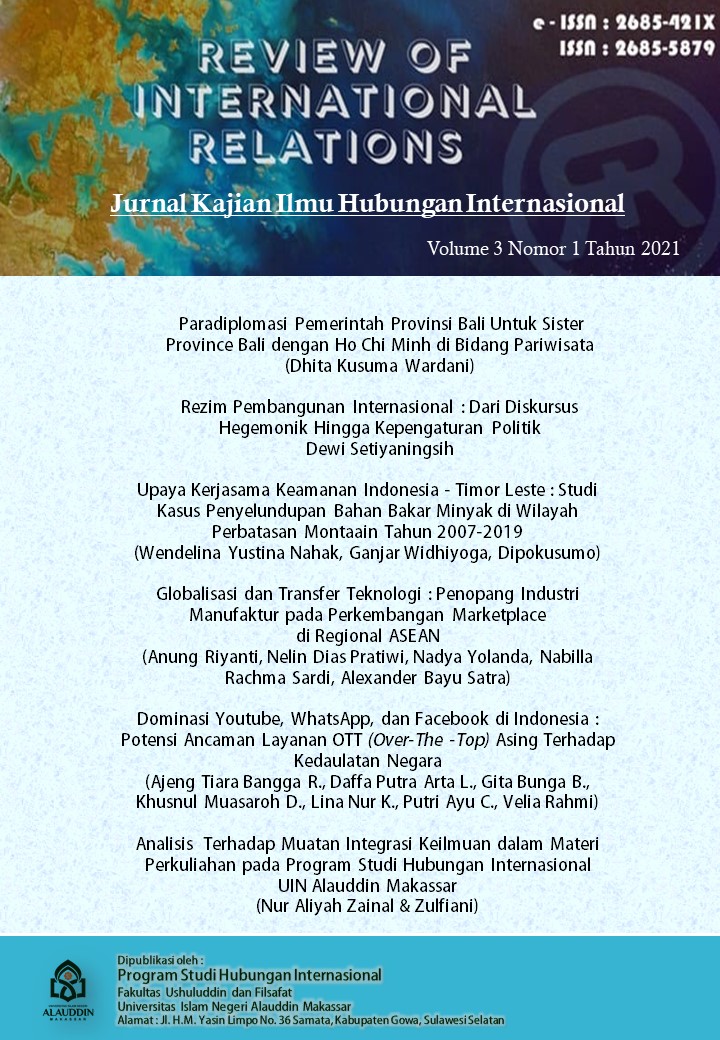REZIM PEMBANGUNAN INTERNASIONAL: DARI DISKURSUS HEGEMONIK HINGGA KEPENGATURAN POLITIK
Abstract
Poverty and inequality has been being most concern problem for international community in decades. The idea to tackle these problems then created the development norm which becomes international development regime. This paper examines the problem of international development concept and how the conception is normally adopted by the developing countries as the main development model. It combines two critical aproach to analyze, postcolonial perspective developed by Gayatri Spivak and governmentality developed by Michele Foucault. Postcolonial perspective is used to analyze the problem of international development concept, while governmentality is used to analyse how the conception is adopted normally through the global political structure. It shows that the concept of international development defined by inter-governmental like UN (United Nations) contains hegemonic idea which is practiced normally through international institutions, governmental and non governmental organization.
Keyword: international development, development regime, developmentalism.
Downloads
References
Amin, S. (2006). The Millenium Development Goals: A Critique from the South . Monthly Review.
Angelis, M. D. (2016). Ekonomi Politik Governance Neoliberal Global. In M. H. (Peny), Petaka Neoliberalisme (Terj) (pp. 1 - 36). Yogyakarta: Intrans Publishing.
Battersby, J. (2016). MDGs to SDGs – new goals, same gaps: the continued absence of urban food security in the post-2015 global development agenda. African Geographical Review DOI: 10.1080/19376812.2016.1208769, 1 -15.
Burchell, G. (1991). The Foucault Effect: The Studies in Governmentality. US: The University of Chicago Press.
Caroll, T. (2010). Delusions of Development: The World Bank and The Washington Consensus in Southeast Asia. UK McMillan: Palgrave Macmillan.
Foucault, M. (1977). Discipline and Punish: Tge Birth of the Prison. New York: Vintage Books.
Foucault, M. (1980). Power/Knowledge: Selected Interviews and Order Writings 1972-19777. New York: Phanteon Books.
Gas, M. M. (2016). The World Bank and IMF in Developing Countries: Helping or Hindering? International Journal of African and Asian Studies. Vol. 28, 38-49. https://core.ac.uk/download/pdf/234690231.pdf
Hartwick, R. P. (2015). Theories of Development: Contentations, Arguments, Alternatives. US: The Guilford Press.
Hickel, J. (2017). The Divide. UK: Penguin Press.
Inada, J. (2017). Evolution of International Development Assistance Regime—Harmonization of Aid Policies among Major Donors and Its Structure. Retrieved Juli 2018, from https://www.researchgate.net/publication/242754526
Kanbur, R. (2009). The Co-Evolution of the Washington Consensus and the Economic Development Discourse. Macalester International: Vol. 24, Article 8. DOI: 10.22004/ag.econ.48920
Li, T. M. (2007). The Will to Improve Governmentality, Developmentand the Practice of Politics. Durham & London : Duke University Press.
Li, T. M. (2016). Petaka Neoliberalisme. Yogyakarta: Intrans.
Oxfam. (2018). Rewar Work, Not Wealth.
Rist, G. (2008). The History of Development: From Western Origins to Global Faith. UK: Zed Books.
Ruggie, J. G. (1982). International Regimes, Transactions, and Change: Embedded Liberalism in the =Postwar Economic Order. International Organization 36(2) .
Saad-Filho, A. ( 2011). Growth, Poverty and Inequality: Policies and Debates from the (Post-) Washington Consensus to Inclusive Growth. Indian Journal of Human Development, Vol. 5, No. 2, 321-344. https://doi.org/10.1177/0973703020110202
Sharp, J. B. (2004). Indigenous knowledges and development: a postcolonial caution. Third World Quarterly 25:4 DOI: http://dx.doi.org/10.1080/01436590410001678915, 661-676.
Spivak, G. C. (1988). Can the Subaltern Speak? Die Philosophin, 42-58.
Sylvester, C. (1999). Development studies and postcolonial studies: Disparate tales of the 'Third World. Third World Quarterly 20:4 'DOI: 10.1080/01436599913514, 703-721.
Whitman, N. K. (2011). The Millennium Development Goals and Development after 2015. Third World Quarterly, 32:1 DOI: 10.1080/01436597.2011.543823, 181-198.
Copyright (c) 2021 Review of International Relations (Jurnal Kajian Ilmu Hubungan Internasional)

This work is licensed under a Creative Commons Attribution-ShareAlike 4.0 International License.










